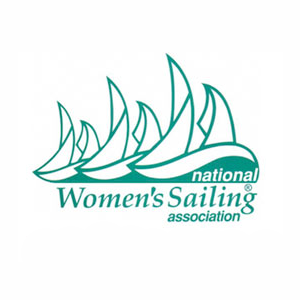Getting On Board Now: Overcoming the Challenges of Learning to Sail and Earning Respect in a Traditionally Male-Dominated Field
NWSA’s last blog post, “You’ve Come a Long Way, Baby,” explored the challenges and lessons of early sailing in a male-dominated field. The referenced ad slogan was a good fit for where the sport of sailing started for women and is progression in the early years. The same company continued its empowering message for women with a subsequent slogan: “Find Your Voice.” Again, the slogan is a good fit for our progression in the sailing industry. Sailing is certainly more accessible for women now, but getting in with a mixed crew position on bigger, competitive boats in the offshore circuit can still be an uphill battle. Even on a smaller scale, finding the respect you’re seeking from your male sailing counterparts can still be challenging at times. So what’s a female sailor to do? How do you find your voice?
Take a Class
Education is never a waste of time. With the availability of certifications and formal instruction, there is a plethora of opportunities available today. US Sailing and the American Sailing Association both offer classes that improve your skills, no matter what your current level. These formal training opportunities will bring confidence to your skills and make you a more valuable crew member.
If racing is your passion, look for schools that offer racing, sail trim, or spinnaker courses. Some schools even have agreements with local yacht clubs whereby students are given opportunities to crew on yacht club members’ boats.

Learn a skill. Practice. Become an expert.
Hone a Skill
If you haven’t honed a particular skill already, doing so makes you valuable! Sail-making, rigging repair, sail repair, medical care (as simple as CPR/First Aid to as in-depth as EMT), navigation (both GPS and dead reckoning), diesel engine maintenance and repair, vessel electrical systems, VHF radio operations, AIS, weather – all of these skills are valuable and needed on sailing vessels whether racing or cruising. Pick one or more and become an expert.
The US Power Squadron, Coast Guard Auxiliary, local community college and private vendors typically offer training in all of these skills and more. Additionally, many all-women’s sailing conferences are offered nation-wide throughout the year. Be open to learning opportunities at these conferences and then seek and pursue additional in-depth training in these areas.
Find a Mentor
Investigate your local yacht club(s), specifically aiming to find one that is “woman friendly”. Ask if they have any courses, mentors or events designed specifically to advance sailing for women. Look for a boat owner, male or female, who will share their knowledge and give you helm time. Ask your US Sailing or ASA school if they have a sailing club or charter their boats with sailing friends and learn what it means to be in charge and oversee all functions on a sailboat. Get the global picture, not just a specific crew job aboard the vessel. This makes you a more well-rounded sailor and translates into making you a better crew person overall.
Seize the Day
Lastly, no matter what sailing opportunity comes your way, take it! Be smart by investigating the seaworthiness of the vessel and ability of the skipper, but if all checks out, never turn down an invitation to crew or be a guest on a sailboat. Every boat and every crew has somewhere to take you on your path to learning and growing.
Best of luck with your sailing endeavors!
Linda holds the fastest woman singlehanded record SF-Japan. She has sailed and raced extensively on the West Coast, sailed the Singlehanded Transpac to Hawaii twice and is a veteran of the LA-Honolulu Transpac and the Pacific Cup. In 1997, on her own boat, she skippered an all women’s crew in the LA – Honolulu Transpac taking a second place division finish. With a 100-ton Merchant Marine License, Linda teaches sailing and is a certified American Sailing Association instructor. She is presently President of the National Women’s Sailing Association and is Vice President of Administration for Recreational Boaters of Washington which represents recreational boaters interests in Washington state legislative and regulatory actions.
Now living in Port Hadlock, Washington, Linda teaches adult sailing classes at the NW Maritime Center in Port Townsend and also teaches a variety of boating classes to members and the public as a certified US Power Squadron instructor. She co-founded the ongoing Northern California Women’s Sailing Seminar in 1992. She has served as Commodore of the Island Yacht Club in Alameda, CA, Pacific Inter-Club Yacht Association and Pacific Coast Yachting Assn. She also served on the Recreational Boater’s of California Board as President in 1999 and as a Director from 1993 to 2006. Newland is Past Commander of the Point Wilson Sail and Power Squadron and is a past Squadron Education Officer and presently serves as Asst. Squadron Education Officer. She also presently serves as a director on the Board of the NW School of Wooden Boatbuilding. Newland is the WSF/NWSA immediate past president.
Linda is a retired school district administrator and maritime attorney.
